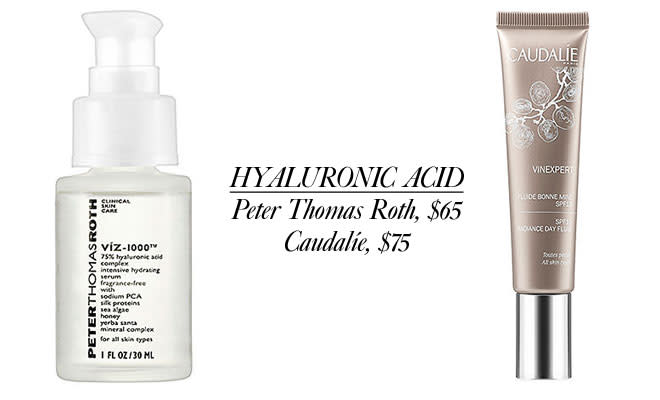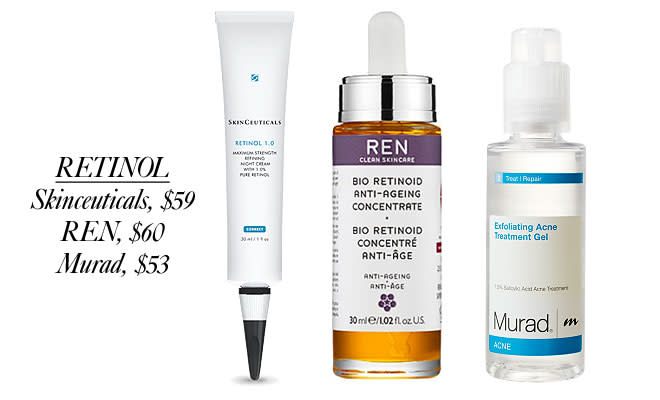The Top 5 Skin Care Ingredients You Need to Know

If "hyaluronic acid" sounds to you like the last thing you'd want to put on your face and "ceramide" makes you think of pottery, you're not alone. Unless you studied product labels as your foreign language of choice, it can be tough to figure out what all those science-y terms mean. Below, we break it down to the basics, highlighting five common skin care ingredients you're bound to run into - and exactly what they do.
MORE: Get Gorgeous Hair In A Hot Minute (Or Less!)

Hyaluronic Acid
What it is: A naturally occurring substance in the human body that regulates cell renewal, lubricates connective tissue and maintains skin's moisture and elasticity.
What it does: When used topically, hyaluronic acid creates a moisture barrier on the skin, helping to make it smoother and softer. This ingredient is able to hold up to 1000x its own weight in water, thus producing amazing benefits for dehydrated skin. As an injectable, hyaluronic acid works as a plumper, filling wrinkles and fine lines. Because it is already naturally present in our bodies, hyaluronic acid is a safer alternative to synthetic ingredients and is less likely to be rejected as a foreign substance. The molecule, however, is quite large and can't fully penetrate the outer layers of the skin to fill wrinkles when used topically.
Try: Peter Thomas Roth VIZ-1000 75% Hyaluronic Acid Complex ($65, sephora.com); Caudalíe Vinexpert Broad Spectrum SPF 15 Radiance Day Cream ($75, us.caudalie.com), Juvederm (find a doctor at juvederm.com).

Retinol
What it is: An active form of the vitamin A molecule.
What it does: Retinols are powerful exfoliants that encourage the skin to shed dead and problematic layers and turn over younger, healthier cells. They also increase the production of hyaluronic acid and collagen, making skin more supple and smooth. Using retinols can improve the firmness of skin, reverse signs of sun and environmental damage, treat acne and reduce hyperpigmentation, dark circles, fine lines and wrinkles. It's no wonder retinols have long been touted as a skincare miracle!
Try: Skinceuticals Retinol 1.0 ($59, skinceuticals.com); REN Bio-Retinol Anti-Aging Concentrate ($60, sephora.com); Murad Exfoliating Acne Treatment Gel ($53, murad.com).

Ceramide
What it is: Lipid molecules that are found in high concentrations within cell membranes. In the top layer of the skin, ceramides hold skin cells together, forming a protective layer that plumps the skin and retains moisture. (Think of skin cells as the bricks and ceramides as the mortar.)
What it does: In skincare products, ceramides are used to replenish the natural lipids that are lost from exposure to harsh environmental factors, use of drying products, and during in the aging process. They restore moisture, fortify the skin's natural barrier and help protect it against harm from foreign elements. Ceramides are also particularly effective in treating eczema.
Try: CeraVe Facial Moisturizing Lotion AM with SPF 30 ($13.99, walgreens.com); Elizabeth Arden Ceramide Capsules Daily Youth Restoring Serum ($72, elizabetharden.com); Mario Badescu Ceramide Eye Gel ($18, mariobadescu.com).

Peptides
What it is: Peptides are segments of active proteins that communicate with cells and instruct them to behave in certain ways. In the skin, peptides may signal elastin production (elastin helps skin "bounce back") or prompt skin to heal itself after a wound.
What it does: The peptides used in anti-aging products enter skin cells and instruct them to do certain things such as (surprise, surprise) produce collagen, alleviate redness or signal muscles to relax, thereby minimizing wrinkles. One common peptide found in skincare products is 'palmitoyl pentapeptide' which has been shown effective in fighting wrinkles. There are other peptides that don't directly stimulate your skin to do anything, but because they are so small can penetrate deep into the layers and act as a delivery mechanism for other ingredients. Copper peptides, for example, bring molecules of copper deep into the skin where it can improve wound healing from the inside out.
Try: StriVectin Power Serum for Wrinkles ($99, strivectin.com); DDF Wrinkle Relax ($88, ddfskincare.com); Sunday Riley Bionic Anti-Aging Cream ($225, sephora.com).

AHA/BHA
What it is: Alpha hydroxy acid and beta hydroxy acid are classes of organic acids that act as exfoliants. AHAs are derived from fruit and milk and include glycolic acid (sugar cane), lactic acid (milk), and malic acid (apples and pears) among others. In cosmetics, BHA refers exclusively to salicylic acid, which is derived from plants.
What they do: While they both exfoliate, AHAs (which are water soluble) work at the surface layer of skin only while BHAs (which are oil soluble) penetrate deeper and hels remove dead skin cells clogged in pores. BHAs are used primarily for oily or acne prone skin with blackheads and whiteheads, whereas AHAs are used to brighten dull or dry skin. However, often you may find products containing both AHA and BHA for double duty exfoliation. The amount of exfoliation depends on the strength of the acid, with the stronger stuff available by prescription only.
Try: DermaDoctor Ain't Misbehavin' Medicated AHA/BHA Acne Cleanser ($25, ulta.com); REN Resurfacing AHA Concentrate ($45, sephora.com); Philosophy Clear Days Ahead Overnight Repair Salicylic Acid Acne Treatment Pads ($39, sephora.com).
What are your favorite products with these glow-getting ingredients?
MORE:
13 Scary Celebrity Beauty Looks
Twitter Roundup: Our Beauty Crushes Weigh In On #Sandy
10 Outrageous Celebrity Costumes

